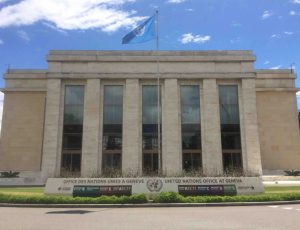This week we’re in Geneva giving evidence to the UN on the right to food.
Here’s a quick breakdown of the who/what/why.

What is the right to food?
The right to food is protected within the International Covenant on Economic, Social and Cultural Rights. The UK ratified this Covenant in 1976 but never incorporated the rights in to our legal system – making it difficult for people to enforce them, and less likely that decision-makers will actively promote them.
The technical definition centres on three key words; the right of everyone to have access to adequate food, and that food may be available in to the future. This covers a lot of issues;
- When we talk about access this means everyone having enough money to buy food through the protection of a minimum income standard and social security system that considers the cost of living. It also means everyone being able to geographically access food – paying particular attention to the barriers people face through illness, disability and age.
- When we talk about adequate food we’re talking about the nutritional content of the food available – this includes overcoming diet-related health inequalities. It also means that our food should be free from toxic chemicals, and that our food should be culturally appropriate – including that we may access it with choice and dignity.
- And when we’re talking about the availability of food this touches on the availability of land and other resources so as people may grow food, the existence of processing distribution and markets, and the overall sustainability of the food system – including its contribution to and its resilience to climate change.
In what ways have our governments failed?
The UK isn’t doing great across most of the elements of the right to food. The area that’s attracted the most attention in the last 5 years is household food insecurity – a growing number of people are uncertain whether their income will be enough to meet their food needs. At the harshest end of the spectrum we see a lot of people relying on charity in the form of food banks, but it’s important to remember that there are also a lot of people who don’t or can’t get to a food bank. Because we have no systematic monitoring of food insecurity in the UK we don’t actually know how many people are food insecure.
Food bank volunteers do a good job of supporting people in crisis but this should not be seen as a long term solution – our governments need to tackle the root of the problem – low wages and an inadequate social security net.
What will you be doing in Geneva?
The UN Committee responsible for monitoring compliance with the Covenant is conducting its 5-yearly examination of the UK. The specific meeting that’s happening this week is called an ‘interactive dialogue’ – the Committee ask the UK Government, and the Scottish, Welsh and Northern Irish governments where the matter is devolved, a series of questions based on what it believes to be the main issues relating to Covenant rights. A large number of civil society organisations helped shape these questions, called the List of Issues, beforehand by submitting Pre-Sessional evidence to the Committee, you can read ours here.
During the interactive dialogue civil society will also have the opportunity to intervene, for example if we think the government may not be accurately representing the situation.
We have already submitted detailed written evidence in response to the List of Issues, here.
What happens next?
Once all of the evidence has been heard the Committee will convene and within 2 weeks will publish their Concluding Observations – their recommendations. We’ll be working closely with civil society allies across the UK to ensure our governments act on these.
How can I support?
You can support this work by joining Nourish.
You can join the specific right to food campaign mailing list here.
You can send us love and support on Twitter @NourishScotland and #RighttoFood #CESCR
And most importantly – you can be an advocate for the right to food by talking to your political representatives about it. Three of the largest parties in the Scottish Parliament made manifesto promises on food, including to introduce a Food, Farming and Health Bill – if we want this Bill to progress rights-based approaches to food then our representatives need to know it’s something we all care about.